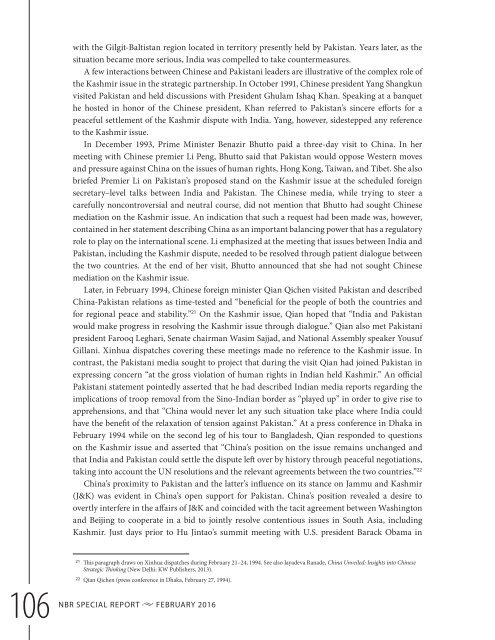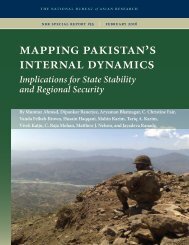pakistan’s
SR55_Mapping_Pakistan_February2016
SR55_Mapping_Pakistan_February2016
You also want an ePaper? Increase the reach of your titles
YUMPU automatically turns print PDFs into web optimized ePapers that Google loves.
with the Gilgit-Baltistan region located in territory presently held by Pakistan. Years later, as the<br />
situation became more serious, India was compelled to take countermeasures.<br />
A few interactions between Chinese and Pakistani leaders are illustrative of the complex role of<br />
the Kashmir issue in the strategic partnership. In October 1991, Chinese president Yang Shangkun<br />
visited Pakistan and held discussions with President Ghulam Ishaq Khan. Speaking at a banquet<br />
he hosted in honor of the Chinese president, Khan referred to Pakistan’s sincere efforts for a<br />
peaceful settlement of the Kashmir dispute with India. Yang, however, sidestepped any reference<br />
to the Kashmir issue.<br />
In December 1993, Prime Minister Benazir Bhutto paid a three-day visit to China. In her<br />
meeting with Chinese premier Li Peng, Bhutto said that Pakistan would oppose Western moves<br />
and pressure against China on the issues of human rights, Hong Kong, Taiwan, and Tibet. She also<br />
briefed Premier Li on Pakistan’s proposed stand on the Kashmir issue at the scheduled foreign<br />
secretary–level talks between India and Pakistan. The Chinese media, while trying to steer a<br />
carefully noncontroversial and neutral course, did not mention that Bhutto had sought Chinese<br />
mediation on the Kashmir issue. An indication that such a request had been made was, however,<br />
contained in her statement describing China as an important balancing power that has a regulatory<br />
role to play on the international scene. Li emphasized at the meeting that issues between India and<br />
Pakistan, including the Kashmir dispute, needed to be resolved through patient dialogue between<br />
the two countries. At the end of her visit, Bhutto announced that she had not sought Chinese<br />
mediation on the Kashmir issue.<br />
Later, in February 1994, Chinese foreign minister Qian Qichen visited Pakistan and described<br />
China-Pakistan relations as time-tested and “beneficial for the people of both the countries and<br />
for regional peace and stability.” 21 On the Kashmir issue, Qian hoped that “India and Pakistan<br />
would make progress in resolving the Kashmir issue through dialogue.” Qian also met Pakistani<br />
president Farooq Leghari, Senate chairman Wasim Sajjad, and National Assembly speaker Yousuf<br />
Gillani. Xinhua dispatches covering these meetings made no reference to the Kashmir issue. In<br />
contrast, the Pakistani media sought to project that during the visit Qian had joined Pakistan in<br />
expressing concern “at the gross violation of human rights in Indian held Kashmir.” An official<br />
Pakistani statement pointedly asserted that he had described Indian media reports regarding the<br />
implications of troop removal from the Sino-Indian border as “played up” in order to give rise to<br />
apprehensions, and that “China would never let any such situation take place where India could<br />
have the benefit of the relaxation of tension against Pakistan.” At a press conference in Dhaka in<br />
February 1994 while on the second leg of his tour to Bangladesh, Qian responded to questions<br />
on the Kashmir issue and asserted that “China’s position on the issue remains unchanged and<br />
that India and Pakistan could settle the dispute let over by history through peaceful negotiations,<br />
taking into account the UN resolutions and the relevant agreements between the two countries.” 22<br />
China’s proximity to Pakistan and the latter’s influence on its stance on Jammu and Kashmir<br />
(J&K) was evident in China’s open support for Pakistan. China’s position revealed a desire to<br />
overtly interfere in the affairs of J&K and coincided with the tacit agreement between Washington<br />
and Beijing to cooperate in a bid to jointly resolve contentious issues in South Asia, including<br />
Kashmir. Just days prior to Hu Jintao’s summit meeting with U.S. president Barack Obama in<br />
106<br />
NBR<br />
21 This paragraph draws on Xinhua dispatches during February 21–24, 1994. See also Jayadeva Ranade, China Unveiled: Insights into Chinese<br />
Strategic Thinking (New Delhi: KW Publishers, 2013).<br />
22 Qian Qichen (press conference in Dhaka, February 27, 1994).<br />
SPECIAL REPORT u FEBRUARY 2016



